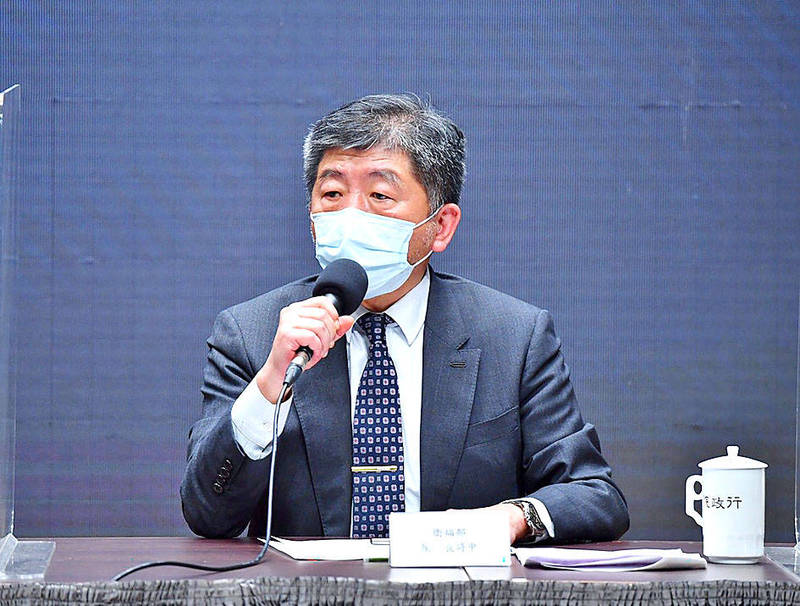《TAIPEI TIMES》 Sufficient capacity for virus cases: Chen

Minister of Health and Welfare Chen Shih-chung at the Central Epidemic Command Center in Taipei on Saturday last week announces measures to control the COVID-19 outbreak. Photo courtesy of the Executive Yuan via CNA
PRIORITIES: The CECC said people who have not had close contact with a case or who do not have symptoms should not visit testing stations as they might catch COVID-19
By Lee I-chia / Staff reporter
The Central Epidemic Command Center (CECC) yesterday said that there is sufficient medical capacity to care for people with COVID-19, and while more testing stations are being set up, priority would be given to people who have been in contact with confirmed cases or who have symptoms.
As more than 1,000 locally transmitted cases of COVID-19 have been reported in the past week, and cases have been found in many cities and counties, the CECC yesterday raised the COVID-19 alert to level 3 nationwide.
“We still have enough medical capacity, so people do not have to be too worried,” said Minister of Health and Welfare Chen Shih-chung (陳時中), who heads the CECC.
Some measures would be taken to enhance the nation’s medical capacity, he added.
Local governments would be asked to set up testing stations at hotspots where many infected people have visited or reside, and the stations would have a priority lane for people who are more at risk of being infected, he said.
“Initially, we urge only those who have had close contact with a confirmed case or who are experiencing symptoms to get tested at the stations,” Chen said. “It would be a waste of resources for people who do not meet those criteria to get tested, and they would be putting themselves at increased risk of infection by visiting a hotspot.”
He said the center would provide guidelines to local governments on effectively informing people of a positive test result, prioritizing them, and admitting them to a healthcare or quarantine facility within six hours of being informed.
Several cases were reported of people who had tested positive having to wait at home before being taken to a hospital or quarantine facility, raising public concern about the infection risk to the community.
If a suspected or confirmed case refuses to comply with the local authority’s arrangements for admitting them to a hospital or quarantine facility, they could be fined for breaching of the Communicable Disease Control Act (傳染病防治法), Chen said.
Moreover, there are 17,789 quarantine hotel rooms nationwide, and 10,501 rooms, or 59 percent, were being used as of Tuesday, so local governments should continue to increase room capacity, he said.
There are 39 centralized quarantine facilities, offering about 4,500 rooms, and there were about 2,000 empty rooms as of yesterday, he said, adding that 2,000 more rooms would soon be added.
The national network of hospitals responsible for COVID-19 and regional emergency response hospitals has been launched, providing about 2,412 hospital rooms for COVID-19 patients and 1,068 negative pressure isolation rooms, Chen said.
Hospital and Social Welfare Organizations Administration Commission Director Wang Pi-sheng (王必勝) said that the “enhanced” centralized quarantine facilities for COVID-19 patients with mild symptoms have healthcare professionals on duty at all times, and patients would have their temperatures read and receive care service phone calls multiple times per day.
A tablet with a camera would be available in the rooms of some patients with health conditions to monitor their blood oxygen, blood temperature and blood pressure, and if their health condition worsens, they would immediately be transferred to a hospital, he said, adding that telemedical services would also be available.
The CECC was asked to confirm a local news report that said the CECC lowered the standard for releasing infected patients from isolation to those who have become asymptomatic, who have only mild symptoms and no longer have a fever, whose onset of symptoms was more than 10 days prior, and who have a cycle threshold (CT) value above 30.
CECC specialist advisory panel convener Chang Shan-chwen (張上淳) said the previous standard was a CT value of 34 or higher, which is a relatively strict standard, as many studies suggest that the virus is no longer infectious in people with a CT value above 28.
As demand for hospital beds for more serious patients is increasing, the panel decided that people who have a CT value above 30 can be released from isolation, but they must practice seven days of self-health management at home.
Separately, National Taiwan University Hospital (NTUH) yesterday confirmed that 10 employees at its Engineering Affairs Office have tested positive for COVID-19, and environmental surface testing found three spots of the virus in the office.
NTUH Deputy Superintendent Wang Tyng-guey (王亭貴) said the index case does repair work and does not have direct contact with healthcare professionals or patients.
A few people who tested positive for COVID-19 had recently visited Taipei’s Wanhua District (萬華) — a hotspot for infections — so the source of infection was likely from outside the hospital.
Close contacts of the confirmed cases have been put under home isolation, and the hospital hopes to test all of its employees within 48 hours, he said.
The hospital would suspend all elective surgeries, not admit new inpatients, and postpone hospital visits that are not urgent at outpatient departments, Wang Tyng-guey said.
新聞來源:TAIPEI TIMES










